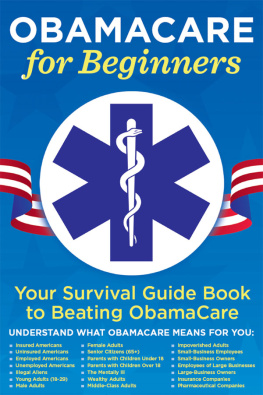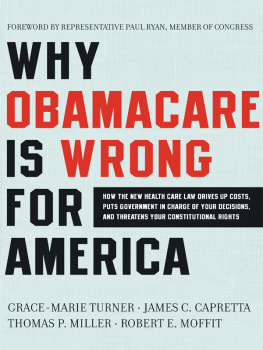Unprecedented
UNPRECEDENTED

The
CONSTITUTIONAL
CHALLENGE
to
OBAMACARE

Josh Blackman

PUBLICAFFAIRS
New York
Copyright 2013 by Josh Blackman.
Published in the United States by PublicAffairs, a Member of the Perseus
Books Group
All rights reserved.
No part of this book may be reproduced in any manner whatsoever without written permission except in the case of brief quotations embodied in critical articles and reviews. For information, address PublicAffairs, 250 West 57th Street, 15th Floor, New York, NY 10107.
PublicAffairs books are available at special discounts for bulk purchases in the U.S. by corporations, institutions, and other organizations. For more information, please contact the Special Markets Department at the Perseus Books Group, 2300 Chestnut Street, Suite 200, Philadelphia, PA 19103, call (800) 810-4145, ext. 5000, or e-mail .
Book Design by Timm Bryson.
The Library of Congress has cataloged the printed edition as follows:
Library of Congress Cataloging-in-Publication Data
Blackman, Josh.
Unprecedented : the constitutional challenge to Obamacare / Josh Blackman.
pages cm
ISBN 9781-610393294 (electronic) 1. National health insuranceLaw and legislationUnited States. 2. Health care reformUnited States. 3. United States. Patient Protection and Affordable Care Act. 4. Health insuranceLaw and legislationUnited States. 5. Medical careLaw and legislationUnited States. 6. Constitutional lawUnited States. 7. Medical careUnited StatesCost control. I. Title.
KF3605.B53 2013
344.7302'2dc23
2013010507
First Edition
10 9 8 7 6 5 4 3 2 1
FOR GRANDPA IRVING,
who told me to always do the right thing
Contents
(October 2, 1989January 20, 2009)
(January 21, 2009March 23, 2010)
(March 24, 2010January 31, 2011)
(February 1November 13, 2011)
(November 14, 2011March 25, 2012)
(March 2628, 2012)
(March 29June 27, 2012)
(June 28, 2012)
(June 29, 2012January 21, 2013)
The Patient Protection and Affordable Care Act of 2010, commonly known as Obamacare, was a unique claim of congressional power. As Chief Justice John Roberts wrote, Congress has never attempted to... compel individuals not engaged in commerce to purchase an unwanted product.
From November 2009 through June 2012, I dedicated myself to the constitutional challenge to Obamacare, first as a Georgetown constitutional law professor and blogger on the popular law blog The Volokh Conspiracy, and eventually as an attorney representing the National Federation of Independent Business (NFIB). Our mission was twofoldto save our country from Obamacare and to save the Constitution for our country. Throughout the entire process, I focused on one simple ideathat the federal government cannot mandate that you purchase health insurance. Such a claim of power was not only unprecedented, it was also unlimited, unnecessary, and dangerous.
During that time, as a law professor, I authored dozens of law review articles, op-eds, and blog posts in which I helped develop the constitutional theory and arguments that were ultimately presented to the Supreme Court. When I first began this journey, most other academics scoffed at the very notion that this claim of power by Congress was unconstitutional. Many even deemed our objections frivolous. I and a small group of constitutional scholars and attorneys thought differently, and we continued to develop and refine our constitutional arguments as events unfolded.
To help bring this message to the general public I gave speeches, did countless interviews on television and radio, and debated the topic across the country, all of which made me the public face of the constitutional challenges to Obamacare. In addition, I worked closely behind the scenes with some superb attorneys representing various challenging parties at the district court level to hone their arguments in response to the governments evolving defense of Obamacare. Together with lawyers from the Cato Institute, I submitted amicus briefs to all the federal circuit courts of appeals considering the case. To get a sense of how these arguments played in the courts, I was the only person to be present at all of the pivotal lower court hearings in Pensacola, Richmond, Cincinnati, Atlanta, and Washington, and eventually at the U.S. Supreme Court.
After decisions by federal district court judges in Virginia, Florida, and Pennsylvania held that Obamacare was unconstitutional, the Jones Day law firm and I became the legal team for the NFIB during the appellate phase of its lawsuit as co-plaintiff with the attorneys general of twenty-six states. Through the tireless work of my co-counsel, the attorneys general and their lawyers, and those who submitted amicus briefs, we were able to secure a victory in the Eleventh Circuit Court of Appeals in Atlanta.
The Supreme Court soon granted review of our case. But the justices didnt just accept the case: they granted six hours of oral argument time, spread over the course of three days, to flesh out all the issues. As Josh Blackman details in Chapter 5, that amount of time for oral argument is exceptional in the modern era of the Court and was an indication that those who doubted the seriousness of our challenge should have reassessed their claim that it was frivolous.
After the arguments, in which a majority of the justices seemed skeptical of the governments defense of Obamacare, I became guardedly optimistic. The justices fearlessly engaged the issues head-on and placed the burden on the government to justify this unprecedented expansion of federal power beyond anything the Supreme Court had sanctioned before. They did not appear at all satisfied with the governments effort to identify some judicially enforceable limit on its claimed power to make all Americans purchase a product as part of a congressional scheme to regulate interstate commerce.
However, soon after the case was submitted to the Court, I became distressed by an extraordinary and unprecedented effort to try to influence the Courts private deliberations. When I was a criminal prosecutor in Chicago, after a case had been submitted to the jury, I could safely retire to my office to work on other cases knowing the jury would be insulated from further appeals from my adversaries. Not so here. After this case was submitted to the Supreme Court, many on the leftfrom President Obama to Patrick Leahy, the chairman of the Senate Judiciary Committee, to journalists such as Maureen Dowd, E. J. Dionne, and Jeffrey Rosenvociferously waged what I called a campaign of disdain against the conservative justices in general, and Chief Justice Roberts in particular, in an effort to influence and even intimidate one or more of the justices to capitulate.
Their efforts were all the more troubling in light of the report that, at the very time when these attacks were at their peak, the chief justice began to pull back from his initial conference vote to invalidate the individual insurance mandate. Although we may never learn whether the chief justice changed his voteand if so, whythese preemptive attacks on the Courts legitimacy should it invalidate the presidents signature legislation left a stain on the entire case.
What happened on decision day in June 2012 was also unprecedented. Five justices (Roberts, Scalia, Kennedy, Thomas, and Alito) held that the individual mandate exceeded Congresss powers under the Constitution, just as I and others had contended since November 2009. At the same time, however, five justices upheld most of the Affordable Care Act. Though Justices Ginsburg, Breyer, Sotomayor, and Kagan would have upheld the insurance mandate
Next page






